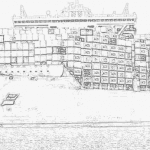It was our fourth day in the jungle. The dusk was falling in and we had a lot of ground to cover. I had no intention of staying for a fifth day in this punishing jungle. We were covering ground faster. The only thing I could see was the steps of soldier walking ahead of me. The bruise because of heavy back pack had started hurting. The straps of AK-47 were removed because they get stuck in the foliage thereby compromising speed, although it meant nowhere to support the damn rifle. With Khukri, the famed curved knife in our left hand we were moving fast cutting the intervening foliages. With three leech bites and a layer of salt precipitated on the face, the body was moving in what the soldiers say ‘Auto Mode’.
The mesmerising beauty which was visible from the aircraft has vanished like a dream. These are one of the world’s toughest terrains. The tree cover so thick that even the sunlight struggles to reach the ground. The precipitation so prominent and continuous that is drizzles throughout inside the forest. The track was so slippery that you start doubting your centre of gravity. Though thanks to the tribals, there were hardly any animals left but there was this irritating creature known as leech which turned out to be the biggest hurdle. The leech would smell the human incense and suddenly appear on leaves and ground, jumps and then stuck on the skin. The worst part is that you don’t even realise it is there till the time it has done its job of sucking all the blood to the best of its capacity.
It was in such a contrast to what I had seen from the aircraft, descending over the Lokhtak Lake, famous for its circular shaped fishing areas and pristine beauty. Talk of virgin lands and India’s North Eastern states have a plenty to offer. The greenery is breath taking. The mountains appear as though God has frozen an ocean with all its waves and coloured it green. The series of mountain ranges one after the other till eternity is mesmerising. The villages are distinct. The houses are made up of bamboo and leaves, half hanging over the George below. The people are friendly, kids wave to you whenever you pass by in Army vehicles. Despite the place lacking in all basic amenities, the people are happy, their community culture intact.
But the land is not peaceful. Demands from separate nationhood to tribe wise autonomous regions have been faring since ages. Numerous insurgent groups have sprung over the years, their strength varying from 20 odd people to thousands. Continuous fighting has bleed both the Armed forces and insurgents. The soldiers were helpless, all these years they have been trained to shoot to kill without having to make sure whether the person standing in front of him is a friend or foe.
The state government had stuck a peace accord with few insurgent groups. The terms of ceasefire were actually quite generous. The insurgents were allotted accommodation in camps where in they can stay with their families, trained in basic tasks such as weaving, bamboo art, candle making and the likes. Their bank accounts were opened with 20,000 rupees and they were entitled for a monthly stipend of 3000 rupees. These are much more than any simple Manipuri youth can dream of. On top of that they are allowed to carry arms within their camps for security as other groups might attack them. These groups are generally near Army posts which make monitoring their activities easy. There was a catch though, they can end the ceasefire whenever they like. The Army cant because they are ‘Our own people’ and then we would be blamed for ‘Human rights violations’.
My post was situated in a pristine valley surrounded by series after series of mountains as far as the eyes can see. The village of Parbung was nearby and the locals are frequent in our posts. Over the years the Army has build quite a reputation for itself becoming an administrator of sorts. From managing schools in the hinterland to provision of electricity, maintenance of roads and organising medical camps, you name it and we do it. I had found a special friend in Lalboy. He was a versatile Manipuri who knew everyone in the village, can play guitar was an excellent volleyball player and was like a buddy to me. He uses to teach me uses of Khukri, identification of leaves and foliages and practically lived in the Army camp.
But the situation started worsening. Reports of new insurgent groups being formed have already started coming. There were reports of extortion from far off villages. Lalboy’s uncle had been badly beaten when he refused cooperation. His sister suffered molestation while coming back from the farms. My post being at the brink of India was especially vulnerable. We use to joke that if there is a landslide, we will slip to Myanmar. Reports of enemies Border Action Teams (BAT) were already in the news. We have increased our activities near the border. The patrols became frequent, the bullet proof jackets came back and additional ammunition being carried. In case of eventuality, we have to fight self sustained since the nearest Army post was three hours away and since there was only one road joining both our camp, it is always easy to block it.
It was then the monotony of thoughts was broken by a sudden halt. The leading scout had spotted something. Everyone took positions, alternately covering the back of soldier ahead of him. The movement was swift and the only sound one could hear was his own breath. There were four armed men, carrying US made M-16 rifles on their shoulders, insurgents definitely. They have taken a break near a big boulder with a stream nearby. The scout looked at me for orders. One blink of an eye and the four men would be history with hundreds of bullets making their bodies beyond recognition. But I had to decide, Quickly.
What is the role of an Army Officer? Is he physically the best in the company? No. Is he the smartest guy around? Debatable. Is he the bravest of them? Maybe may be not. But only one thing sets him apart, he has to take the decision. Based on that one decision, things may make or break. The troops of the Indian Army bestow so much confidence in their Officers that they will not question the decision. You want to march to the gates of hell, they will promptly follow. And this makes the decision all the more important. Their lives depend on you. The fate of their families hinges on your decision. And that is why an Officer has to be more aware so that he can decide where his troops will fight, because wherever he says, they will fight.
The troops were waiting for the decision. Four insurgents, in the middle of the jungle, what are they doing here. Why only four? Where are others? They are relaxed, not expecting combat, definitely not expecting danger. Where are they going? The map of my Area of Responsibility (AOR) flashed through my eyes. The track goes to Sinjol village. Why Sinjol? It is the Head Quarter of MRA (Manipur Revolutionary Army), an insurgent group which recently came under ceasefire. Shit!! These men are from MRA. They must be going to get the monthly stipend of cadres from their Head Quarters in Sinjol. I had specifically instructed them to go by road to avoid any confusion but clearly they had chosen the shorter way through the jungle.
Luckily the troops were still looking at me. All those thoughts would have passed through my mind in a flash. I clinched my fist signalling ‘Hold Fire’ and the barrels of everyone’s AK-47 came down. The front scout challenged them by shouting, asking them to lie on the ground. They comply promptly. They had single handily jeopardised the entire cease fire because of their stupid action. My anger knew no bounds. I kicked the first one in the stomach, pulled the other one with hair and threw him in the shallow stream. The remaining two cowed down near the boulder. I picked the third one and stopped suddenly. I couldn’t believe my eyes when I saw Lalboy in front of me! I said ‘What?!! Looking down he said ‘sahab, joining them seemed lucrative’.
I can’t say if my action was a consequence of their irresponsible behaviour or the frustration of our four days sojourn in the jungle. But all I can say is that the cease fire still holds. When I was sipping coffee in a makeshift hut in my company on the hill top, I was wondering, ‘why in the world Lalboy joined them?’
Indian Literature and Fiction | Authors | Saket Patanwar writes on Indian Review.



Leave a Reply